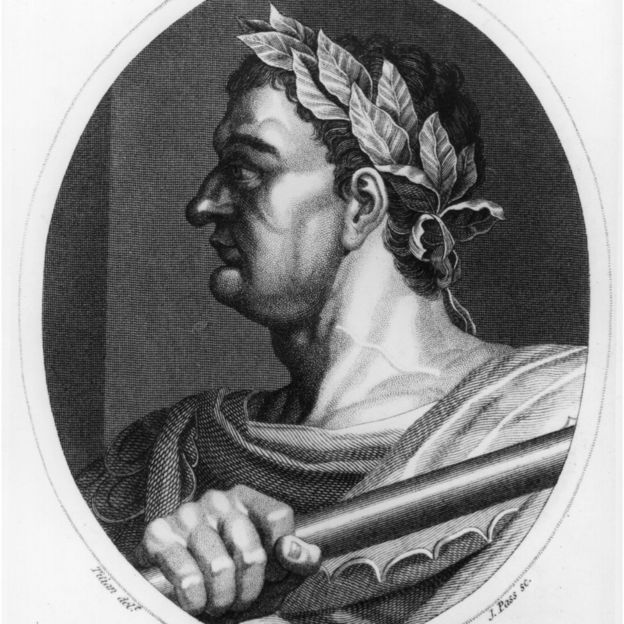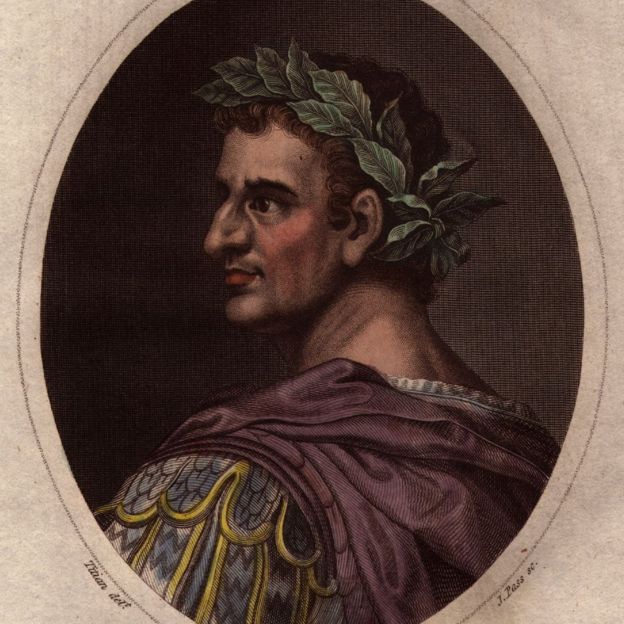
This year saw reports of two executions of high-ranking North Korean officials and an endless stream of speculation about Kim Jong-un and his leadership style. Stephen Harrison, professor of Latin literature at Oxford University, considers the parallels with ancient Rome - as told by its historians.
North Korea's vice-premier Choe Yong-gon was said to have been shot in May, after he "expressed discomfort against the young leader's forestation policy", while Defence Minister Hyon Yong-chol was said to have been executed by anti-aircraft weapons in front of an audience of hundreds, reportedly charged with treason for disobeying orders, falling asleep at a military event and being disloyal to the supreme leader.
These reports evoke some interesting parallels from the darker side of the history of ancient Rome, or at least from the more colourful stories told about it by Roman historians.
The similarities are striking. In both cases, we rely on a small number of reports from potentially biased origins in order to gain a view of a distant and inaccessible society.
Arguably, our sources for ancient Rome, some 2,000 years ago, are at least as extensive as those for modern North Korea, and, perhaps, even more reliable.
The main ancient sources in Latin on the early Roman Empire are the imperial biographies of Suetonius and the historical works of Tacitus.
The two men were friends and officeholders in the Roman state, and shared an essentially pessimistic view of the system of emperors.
 Hulton Archive
Hulton Archive
In particular, both had lived through and endured the reign of the Emperor Domitian, whose erratic and tyrannical behaviour plainly coloured their views of emperors in general.
For Suetonius, this comes out in his Lives of the Caesars, gossipy and occasionally muck-making biographies that show the emperors as weak human beings.
For Tacitus, his Annals and Histories show how the imperial system put too much power into the hands of one individual or dynasty, with catastrophic effects on the state such as familial infighting, civil war and unsuitable leaders.
The reported fates of the North Korean ministers evoke these pessimistic and sometimes melodramatic accounts of some of the more colourful emperors.
'Trusted' advisers
One of the key issues for Roman emperors was their tendency to be dependent on particular individuals as advisers.
As with similar modern autocrats, one problem for the suspicious and capricious supreme rulers of Rome was how long such advisers could be trusted, and how to get rid of them once the emperor's trust was lost, or once he became tired of them.
A spectacular public end made it clear who was really in charge, and encouraged obedience and servility through vivid intimidation (it could be the spectator next).
 Hulton Archive
Hulton Archive
One example is the Emperor Tiberius, successor of Augustus and the emperor under whom Jesus was executed, who for some years depended on the services of his commander of the guard, Sejanus.
Sejanus was so trusted by Tiberius that the ageing emperor felt able to retire to a life of pleasure on the Italian island of Capri, leaving Sejanus to run things for him in Rome.
But eventually (we are told) the emperor's suspicions won out, and Sejanus was cunningly brought down by being lured to the Roman Senate to hear a letter from Tiberius read aloud before the assembly.
The letter was supposed to bring him promotion and marriage into the imperial family, but in fact contained a complete denunciation and a death sentence.
He was taken to prison, strangled and his body hacked to pieces in the streets by the Roman mob.
Caligula and Nero
Tiberius's successor Gaius, better known as Caligula, was more overtly sadistic.
His executions were often public events: he is said to have burned a comic playwright alive in the middle of the amphitheatre, because of a humorous line of double meaning in a show.
And when a Roman aristocrat who was being thrown to the wild beasts in the public arena loudly protested his innocence, Caligula had him taken out, had his tongue cut out, and then sent him back to be finished off.
 Hulton Archive
Hulton Archive
Nero, a generation later, was little better. Again getting rid of ministers was an issue: all the four advisers who helped him most on his route to the throne died on his orders within eight years.
One of them, Burrus, was sent a poison that Nero pretended was a throat medicine, while another, the philosopher Seneca, was forced to kill himself by opening his veins in a hot bath.
But his most famous public executions were those of the early Christians, who, as the historian Tacitus tells it, were blamed by Nero as convenient scapegoats for the great fire of Rome, which destroyed the city in AD64.
A mass of them was dispatched by being covered with wild beasts' skins and torn to death by dogs in the arena, or by being fastened on crosses in his public gardens and set alight to serve as novelty lamps by night.
Biased motives
These stories all come - like the South Korean reports - from hostile sources.
Modern historians are sceptical about many of them, and in some ways they show how some Romans felt about the potential dangers of hereditary autocracy rather than reliably retelling the details of history.
Just like North Korea, Rome could be presented by interested parties as presided over by a youthful ruler who had been brought up without normal moral boundaries, who felt acute suspicions of those close to him, and who could exercise absolute power of life and death, backed by the might of a highly militarised state.
In both cases, there are clear motivations for bias: Suetonius and Tacitus were in some ways in conflict with the imperial system, just as South Korea and North Korea are still in some sense at war with each other.
In such an environment, traditional stereotypes about tyrannical rule are likely to emerge, especially where one side maintains rigorous restrictions on information, creating a vacuum which the other is keen to fill for the benefit of a more "liberal" global audience.
As with ancient Rome, we need to be aware of the potential unreliability of biased reporting, and the natural tendency to demonise political opponents.
Melodramatic colouring of events is just as manipulative as controlling and limiting what is disseminated to the world.
Stephen Harrison is professor of Latin literature at Oxford University.



No comments:
Post a Comment